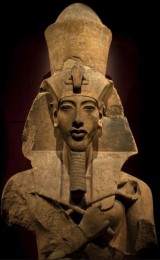 出埃及记第三课:摩西与法老:出埃及记 4:18-7:13
出埃及记第三课:摩西与法老:出埃及记 4:18-7:13
摩西是《圣经》里的重要人物之一。也许以下的问题会让您认识他更深。
一。出埃及记4:18-20:摩西尊重岳父__ __ 对他有礼貌,请他让他回哪里?摩西没有告诉岳父神给了他什么使命,算不算向岳父撒谎?新约《圣经》要求基督徒要说实话, 但(除非在法院)它不要求我们把“全部”故事说出来。
二。出埃及记4:21-23:《圣经》第一次把以色列民族形容为神的长 __。请注意:神早宣布告诉法老他要__ __法老的儿子。(在另外一个课程里,我们会讨论神所说的一句话: “我要使埃及王的心刚硬” ——4:21。)
三。出埃及记4:24-26:神会杀死摩西吗?摩西还没有为儿子行__ __。神为以色列人所捡选、所预定的领袖(摩西)不可以忽略此“与神立约”的记号。 (参看创世记17:9-14。)
四。出埃及记4:27-31:摩西和亚伦第一次与以色列的长老聚集,长老们__ __摩西的话;他们就向神__ __。请背诵31节:“ 百姓就信了。以色列人听见耶和华眷顾他们,鉴察他们的困苦,就低头下拜”。
五。出埃及记5:1-23:请述说摩西、亚伦和法老的第一次对抗。
六。出埃及记5:1-23:法老为什么轻视耶和华神?因为它还没有见到耶和华神的___ ___。法老认为,如果希伯来人都是他的奴仆,他们的神的能力也不会太强,否则他们不会那样吃苦。他们为什么要求法老给他们三天时间去旷野敬拜神?法老不但不让他们去,他颁布了新的命令是什么?因此,领班们对摩西怎么样?摩西既得知做希伯来人的领袖是很___,他又发现神的时 ___表和人的___ 间表不一样(23节)。
 七 。出埃及记6:1-30:请述说神怎么样让摩西知道他要拯救以色列人。从第12节和第30节我们可知摩西讲话还是怎么样的人(有什么问题)?神用什么方法坚定摩西的信心?为了鼓励摩西、为了表达他的权威,神时常说一句话,是什么?
七 。出埃及记6:1-30:请述说神怎么样让摩西知道他要拯救以色列人。从第12节和第30节我们可知摩西讲话还是怎么样的人(有什么问题)?神用什么方法坚定摩西的信心?为了鼓励摩西、为了表达他的权威,神时常说一句话,是什么?
八。出埃及记6:2-3:创世记提到“耶和华”一词几次(譬如,创世记12:1)。为什么出埃及记6:2-3记载说…
和合本:…我从前向亚伯拉罕、以撒、雅各显现为全能的神,至于我名耶和华,他们未曾知道。
新译本:…我曾向亚伯拉罕、以撒、雅各显现为全能的上帝,至于我的名字『耶和华』,他们是不认识的。
普通话本:…我曾向亚伯拉罕、以撒和雅各显现为伊尔什旦(全能的上帝),但从未让他们知道我的名字是耶和华。
在旧约《圣经》里,“知道”(希伯来文)的意思是“深刻的理解”的意思;是“经验过”的意思。所以,出埃及记6:2-3意思是他们未曾经验过耶和华神的能力。以色列人离开埃及之前,以色列人,埃及人和埃及的王都要经历耶和华神的力量。之后,他们都会知道耶和华是谁!他们不会再怀疑耶和华是否有能力!
九。出埃及记6:4-12:神重复他在过去所给祖先的“约”;要点是什么?请注意摩西所提出的三个动词:立(立约:6:4),听(听到哀声:6:5),记念(记念我的约:6:5)。但,希伯来人的反应如何?
十。出埃及记7:1:摩西怎么会代替神?请注意以下的《圣经》版本:
和合本:耶和华对摩西说:”我使你在法老面前代替神,你的哥哥亚伦是替你说话的。
新译本:…看哪,我使你在法老面前好象上帝一样…
普通话本:…我将使你在国王的面前如同神明…
这句话是什么意思? 意思是神不会让摩西,像以前一样,在法老面前羞辱(出埃及记5章)。神要让摩西在法老王面前有神的权威,所以摩西从神受权代表神说话,行神迹等。
十一。出埃及记7:3:神怎么会让法老王的心刚硬?请注意以下的《圣经》版本:
和合本:我要使法老的心刚硬…
新译本:我要使法老心硬…
普通话本:我会使国王顽固不化…
借着神的大能——就是摩西将要行的神迹——以色列人的心会软化,但是王的心只会刚硬(Clyde Woods)。 NIV Study Bible (s.v. Ex. 4:21) 注明《圣经》记载说神使得法老心刚硬(九次);又说法老使得自己心刚硬(九次)。
读者:欢迎您把这篇短文下载,复印,用在您的《圣经》班里。
Exodus Lesson Three: Moses and Pharoah
Exodus 4:18-7:13
1. Ex. 4:18-20: Moses showed his father-in-law due respect and asked permission to ____. In not telling Jethro about the mission God gave him, did Moses lie? ___ The New Testament demands that Christians speak truth honestly but does not require that we tell the entire story (except in a court of law).
2. Ex. 4:21-23: This is the first time in Scripture that the Israelites as an ethnic group are called “my __ __.” Note that early on God told pharaoh that he would ___ his son. (In another lesson we will discuss God’s statement in 4:21, “I will harden the heart of the king of Egypt…”)
3. Ex. 4:24-26: Would God really kill Moses? ___ Moses had not yet ____ his son. The leader that God had chosen for the Israelites must not neglect this sign of their covenant with God (see Gen. 17:9-14).
4. Ex. 4:27-31: The first time Moses and Aaron met with the Israelite elders, the elders ____ Moses, and they all ___ ___. Memorize v. 31.
5. Ex. 5:1-23: Describe the first confrontation between Moses, Aaron and pharaoh.
6. Ex. 5:1-23: Why did pharaoh belittle the God of the Hebrews? (Pharaoh probably thought that since the Hebrews were his slaves, their God had only very little power, otherwise they would not be slaves.) Why did they ask for three days time to go worship? What new regulation did pharaoh promulgate? What was the attitude of the foremen toward Moses? Moses learned that it is very _____ to be the leader of the Hebrews and he realized that God’s [timetable] and man’s are very different (v. 23).
7. Ex. 6:1-30: Describe how God enabled Moses to know that he intended to save the Israelites. From vs. 12 and vs.30, we see that Moses is still what? What did God do to strengthen Moses’ faith? In order to encourage Moses and in order to express his authority, God repeated what statement several times?
8. Ex. 6:2-3: The term “Jehovah” is used several times in Genesis, e.g., Gen. 12:1. Why then do we read in Ex. 6:2-3: “God also said to Moses, “I am the LORD. 3 I appeared to Abraham, to Isaac and to Jacob as God Almighty, but by my name the LORD I did not make myself known to them.“ (Three Chinese translations of these verses are given.) In the Old Testament, “know” means to understand deeply or to experience (Woods, p. 138). In Ex. 6, therefore, it means that they had not yet experienced the power of Jehovah God. Before the Israelites leave Egypt, however, the Israelites, the Egyptians and the pharaoh would experience the power of God. Afterward, they would all know who Jehovah is! No longer would they doubt the power of Jehovah!
9. Ex. 6:4-12: God reiterated a main point of the “covenant”; what was it? List three verbs: Established (a covenant); Heard (groanings); Remembered (the covenant). However, what was the reaction of the Hebrews?
10. Ex. 7:1: In what way could Moses be “like God” to Pharaoh? (Three Chinese translations are given.) What does vs. 1 mean? It means that God would not allow Moses to experience in front of Pharaoh as he did in Ex. 5 (Woods, p. 141.) God wanted Moses to possess the authority of God in Pharaoh’s presence, so Moses was given the authority to represent God, perform miracles, etc.
11. Ex. 7:3: How would God harden Pharaoh’s heart? (Three Chinese translations are given.) God’s power (as seen in the miracles of Moses) would cause the Hebrews hearts to soften and would cause the king’s heart to harden. (See Commentary on Genesis and Exodus in The Living Way Commentary series by Clyde Woods.) According to the notes in the NIV Study Bible (s.v. Ex. 4:21), the hardening of Pharaoh’s heart is ascribed to God nine times (4:21; 7:3; 9:12; 10:1, 20, 27; 11:10; 14:4, 8; Rom 9:17-19) and is ascribed to Pharaoh himself nine times as well (7:13-14, 22; 8:15, 19, 32; 9:7, 34-35).
图片:第二张图片描绘奴隶在埃及做苦工。来自:http://bible.kyhs.me/chajing/Old%20Testament/02Exo/02%E5%90%AF%E5%AF%BC%E6%9C%AC%E5%9C%A3%E7%BB%8F%E6%B3%A8%E9%87%8A/02QT05.htm
圣经问答
出埃及记第三课:摩西与法老:出埃及记 4:18-7:13
Bible Study Questions: Exodus Lesson Three
Exodus 4:18-7:13: Moses and Pharoah
作者:谢德华 ©By Edward Short
本文所问的问题使用汉子圣经。
欢迎您把此文下载用在圣经班或私人学习。
A series of Bible lessons, written in Chinese
and based largely on the text of the Chinese Bible.
You may download and print copies of this lesson
for use in your Bible class.
World Christian Broadcasting
Franklin, TN 37067 USA
